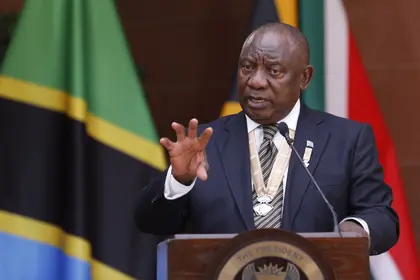High-ranking delegations from so-called “neutral” countries, including China and South Africa, are taking a train to Kyiv to promote “peace talks” to the Ukrainian government as it prepares for a counteroffensive against Russian occupying forces.
On Monday, May 15, a Chinese special envoy started visits to Ukraine, Russia and other European nations to “communicate with all parties on the political settlement of the Ukrainian crisis,” according to the Chinese foreign ministry.
JOIN US ON TELEGRAM
Follow our coverage of the war on the @Kyivpost_official.
An African delegation to Ukraine and Russia will take place “as soon as is possible” to “help find a resolution to the war,” South Africa’s President Cyril Ramaphosa announced on Tuesday. Ramaphosa plans to travel with five other African leaders.
China’s official stance on the war is one of neutrality, but it has been criticized for refusing to condemn Moscow for its invasion. More than a year into the war, Chinese President Xi Jinping finally spoke with his Ukrainian counterpart Volodymyr Zelensky by phone in April, following Xi’s visit to Moscow in March.
South Africa also says that it is neutral, but it has been accused of increasingly moving further into the Kremlin’s sphere of influence. Many African nations have consistently abstained during votes on UN resolutions that in various ways condemn Russia’s actions toward Ukraine.

NATO, Ukraine to Meet Tuesday Over Russian Missile Strike
Last week, UN General Secretary Antonio Guterres said that peace negotiations were “not possible at this moment” with both sides “convinced that they can win.”
Chinese Position
Li Hui, China’s special representative for Eurasian Affairs, will be the highest-ranking Chinese diplomat to visit Ukraine since the start of the full-scale invasion.
Li was China’s ambassador to Russia from 2009 to 2019. Shortly before leaving his ambassadorial post in Moscow, he was awarded the Order of Friendship medal by President Vladimir Putin.
China’s foreign ministry spokesman Wang Wenbin told a news conference last Friday that the aim of Li’s trip to Ukraine, Poland, France, Germany and Russia was to “communicate with all parties on the political settlement of the Ukrainian crisis.”
“China is willing to continue to play a constructive role in building more international consensus on the ceasefire, the cessation of war, the opening of peace talks, and the avoidance of escalation of the situation,” Wang said.
African Aspects
In terms of the African delegation, according to Ramaphosa, Russian President Vladimir Putin and Ukrainian President Volodymyr Zelensky have “agreed to receive the mission and the African heads of state” in Moscow and Kyiv.
Ramaphosa said he had held “separate telephone calls” with Putin and Zelensky over the weekend, where he presented an initiative drawn up by Zambia, Senegal, the Republic of Congo, Uganda, Egypt and South Africa.
Ramaphosa said that the conflict had been “devastating” and Africa “is also suffering a great deal” because of it, with African countries experiencing rising prices for grain, a commodity of which Russia and Ukraine are major suppliers to the continent.
The announcement came after Ramaphosa said South Africa had been under “extraordinary pressure” to pick sides in the war, including accusations by the United States that Pretoria has been supplying weapons to Moscow in contrast to its professed neutrality.
Last week, the US envoy to South Africa said the United States believed weapons and ammunition had been loaded onto a Russian freighter at a Cape Town naval base in December 2022.
In a statement yesterday, the Russian embassy in Pretoria dismissed the US ambassador’s claims as “totally fabricated” and a “pretext” to force South Africa to take sides, adding that locally produced South African arms and ammunition were not suitable for weapons used by the Russian army.
South Africa’s defense minister, Thandi Modise, also denied the accusation in an interview with local newspaper, Mail & Guardian.
“Everybody now sees the spook called South Africa. I can tell you that categorically, we did not send fokol, not even a piece of Chappies to Russia,” she said referring to a local popular bubble-gum brand and using an Afrikaans expletive meaning “nothing at all.”
The commander of South Africa’s ground forces was in Moscow on Monday to discuss military cooperation. On the first anniversary of the invasion, South Africa was holding joint naval exercises with Russia.
Russia in Africa
Since the beginning of the full-scale invasion, Russian Foreign Minister Sergey Lavrov has met leaders of Angola, Botswana, Eswatini, Eritrea, South Africa, Egypt, the Republic of Congo, Uganda and Ethiopia on a series of trips to the continent – four of whom will participate in the delegation to Kyiv and Moscow.
Outside of the Ukraine conflict, Al Jazeera reports that Russia has also been making massive in-roads in other parts of Africa, including Sudan, Central African Republic, and Mali, where the Wagner Group is involved in fighting.
Russia has historical ties with the continent dating back to the Soviet Union, which supported many pro-independence movements in Africa at a time of Western political dominance.
During apartheid in South Africa, the Soviets offered funding and paramilitary training to the liberation movement that became the governing African National Congress (ANC) after democracy in 1994.
You can also highlight the text and press Ctrl + Enter






